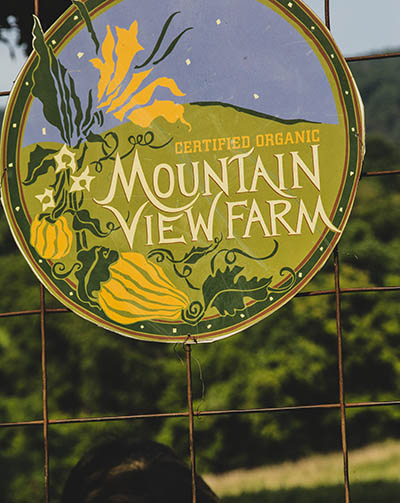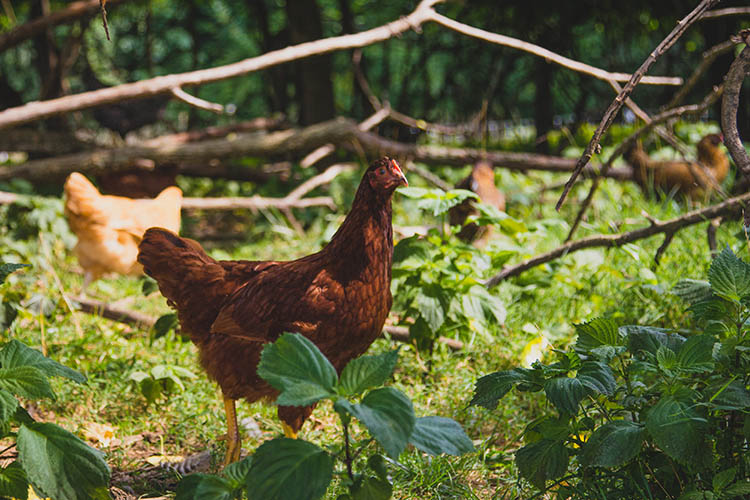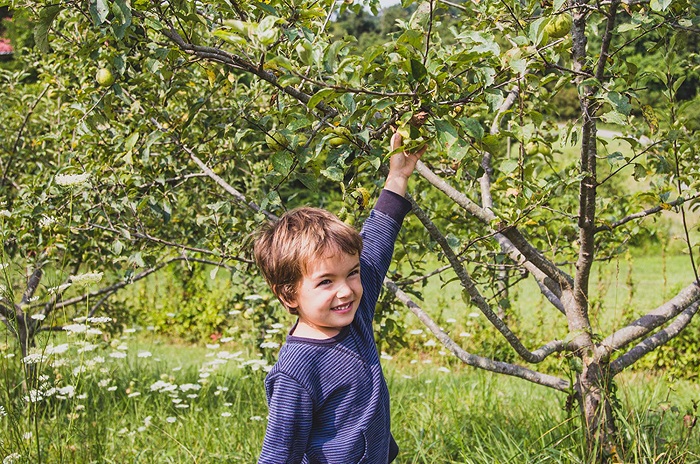An opportunity to grow food and invest in the environment
Attila Agoston and Shawna DeWitt met while working seasonal jobs at a research center in the South Pole. They started farming because, after running fuel stations in the frigid cold for several months, the summer work on an island off the coast of Washington State sounded warmer and entailed access to better food.

“When we first got into this,” Agoston says from a small farmhouse where they now live in Virginia’s Loudoun County, “Shawna was in full-on health mode. She wanted to eat awesome food. For me, I wanted to get dirty and tinker with stuff.”
They found the property where they currently lease farmland online, which was advertised as a nature preserve adjacent to the Appalachian Trail in need of farmers to manage the land. Agoston was originally from Blacksburg, Va., and had gone to Virginia Tech University, but the big draw to this particular property was that it had some infrastructure in place, like fences and a place to live.
“That was a big thing for us coming from seasonal work. The biggest leap for us into farming was — are we going to be able to stay somewhere? It’s not like you just do it a couple months and then take off,” Agoston said.
Finding a property that would involve less investment on the front end was a big plus for the couple when they moved into a little cabin onsite in 2006.
But they didn’t realize at first how unique the property — and their relationship with the nonprofit that owns it — would be, or how long they’d want to stay.
“If you don’t own the land, if you can secure a long-term lease, you can make long-term business decisions and basically minimize the risk.”
Agoston and DeWitt’s Mountain View Farm grows about four acres of certified organic produce on a hilltop overlooking the verdant 900 acres that is the Blue Ridge Center for Environmental Stewardship. Besides working full-time as farmers, the couple serves as onsite caretakers of the property, keeping its paths cleared for visitors and fitting their farm into its vision for land preservation.

“Attila and Shawna do a really nice job of stewarding the land, taking care of it, especially since they’re an organic farm,” said Joe Coleman, who sits on the board for the privately run Blue Ridge Center and chairs its conservation and land use committee. The farmers’ work “ends up protecting the natural resources on the property. They actually end up benefitting the land.”
Agoston and DeWitt couldn’t be happier with the arrangement that’s allowed them to raise food and a family — Emmet is 3 and Ruby is 6 — on this picturesque property for the past eight years. They recently signed a five-year lease to continue their arrangement with the landowners.
“I’m not sure if we’ll ever get rich selling vegetables, but we’ve figured out how to make a living,” said Agoston, who’s been able to invest in the farming business because of the extended lease.
“If you don’t own the land, if you can secure a long-term lease, you can make long-term business decisions and basically minimize the risk.”
In addition to vegetables
As part of their $450-per-month lease, Agoston exchanges 20 hours a month of work for the center doing “lots of mowing” and small maintenance jobs that come up. In addition to the lease, DeWitt is paid to rent out (through airbnb.com) a historic house on the property that sleeps 15 and welcomes Boy Scout groups or bachelorette parties on the weekends. She also works a side job as a trained midwife.
Besides the four acres of vegetables, greenhouses and fruit trees that comprises the bulk of their farm, the farmers keep chickens, pigs and goats on hillier portions of the property that are set aside for agriculture.

They sell a few pigs and goats whole to other farmers or individuals, but mostly the animals are for the family — and to add nutrients to the compost pile.
Agoston plans to change that soon by adding cattle to the operation next year. The 20-acre pasture where they’ll roam will be fenced off from the streams running through the property with the help of state and federal funds available through the local Soil and Water Conservation District.
“Being on leased land where the incentive isn’t high to spend that much money if we don’t own the land, that worked out really great for us,” he said.
Coleman said the animals that are rotated throughout the pastures are also a draw for visitors to the park with children on their way through the center’s 10 miles of trails and water access points.
Agoston and DeWitt spend a portion of their time at the farm answering questions from curious visitors and pointing them in the right direction toward trails or campsites. A sign on the farm’s deer fence tells passersby about the importance of crop diversity on the farm and its role in biodiversity on the landscape.
Agoston said interacting with visitors is a welcome part of the deal that allows them to farm “within striking distance of DC,” where they sell the organic produce at a premium in three of the city’s most popular farmers markets and directly to restaurants.
“I firmly believe, having watched it over the last few years, that Mountain View Farm is really a positive addition. It’s a partnership that should be strengthened even more.”
Taking a year off
Signing the five-year lease also gave the farming family the flexibility to do something they’ve been talking about for years: resting the land and themselves for a season.
This year, instead of driving to and from the city three times a week and hiring summer workers to keep up with harvest, the family spent the month of July on vacation in Alaska. They followed the Biblical model for farming suggested by a friend, which lets the farm rest for a year.
Instead of planting vegetables, they sewed their fields in cover crops like buckwheat and added thick layers of composted mulch to build the soil quality while they were away. They are growing little more than a few pots of produce around their house for food and living off of the money they’ve made in previous years (and the generosity of neighbors).

“We’re in a lot of places with farmers and we see the burnout of both the land and the people,” Dewitt said. “We thought (resting the land) was a great idea in year four. After 10 years, we were like, ‘Remember that thing we were going to do?’”
Even in this “off year,” Agoston is keeping up his end of the management deal with the landowners, maintaining fences and mowing pastures as needed while DeWitt keeps busy delivering babies on the side.
Coleman said the couple’s decision to rest the soils only reinforces their shared vision with the center to do what’s best for the landscape long-term.
The privately run preserve is currently in the process of becoming a state park, which could take several years. Coleman is hopeful that the state will see the value that an organic farm adds to the property and continue to partner with Agoston and DeWitt as managers of the land once their lease expires.
“I firmly believe, having watched it over the last few years, that Mountain View Farm is really a positive addition,” Coleman said. “It’s a partnership that should be strengthened even more.”
This story is part of “Finding a Place to Grow“, a publication produced by The Piedmont Environmental Council. The stories were written by Whitney Pipkin, a freelance journalist from Alexandria, VA who covers food, farms, and the environment. Her work appears in the Washington Post, Virginia Living and the Chesapeake Bay Journal, among others, and she writes at thinkabouteat.com. Photos were taken by Jami McDowell.
The publication was made possible by a grant from The Beirne Carter Foundation.
